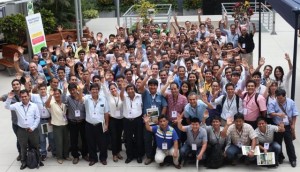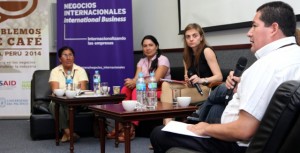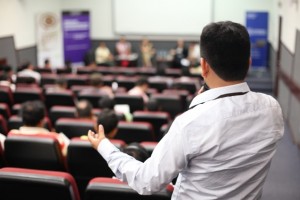Greetings from Lima, Peru, the site of our 7th annual Let’s Talk Coffee® regional event, where Sustainable Harvest® gathers its supply chain to discuss pressing issues and prepare for the upcoming harvest. This year, we’re hosting representatives from 30 cooperatives from around the country, as well as exporters, mill owners, roasters, NGOs, and financiers, for two days of meetings and workshops to prepare for a successful 2014 harvest and beyond. Held at the beautiful Universidad del Pacifico in Lima’s San Isidro neighborhood, this gathering comes at a time of extreme price volatility and reports of Roya affectation around the country, making it an important time to gather together and act transparently.
 First off we heard from Oscar Malca, a professor of international business at the Universidad del Pacifico. The Peruvian cooperatives are no strangers to business, and they know that investment in infrastructure, inputs, and innovation are important to succeed in the international coffee market. What is harder to quantify is the importance of investment in intangible things, like human resources, reputation, experience, and knowledge sharing. Professor Malca encourages Peruvian businesses like the cooperatives to consider these intangible things as important investments equal to physical investments in fertilizer, cars, or wet mills. Sharing institutional knowledge, preserving an international reputation, and avoiding employee turnover, says Professor Malca, are just as crucial to business growth and cost reduction as more tangible goods.
First off we heard from Oscar Malca, a professor of international business at the Universidad del Pacifico. The Peruvian cooperatives are no strangers to business, and they know that investment in infrastructure, inputs, and innovation are important to succeed in the international coffee market. What is harder to quantify is the importance of investment in intangible things, like human resources, reputation, experience, and knowledge sharing. Professor Malca encourages Peruvian businesses like the cooperatives to consider these intangible things as important investments equal to physical investments in fertilizer, cars, or wet mills. Sharing institutional knowledge, preserving an international reputation, and avoiding employee turnover, says Professor Malca, are just as crucial to business growth and cost reduction as more tangible goods.
Following a typical Let’s Talk Coffee® style coffee break—complete with world-class baristas and delicious espresso—the conference continued with a report on the state of long-term production and infrastructure projections in the Peruvian coffee industry. This panel focused heavily on what the government and private sector actors are doing to strengthen the Peruvian coffee industry in the aftermath of Roya, and appropriately featured Jose Muro of the Ministero de Agricultura, Lorenzo del Castillo of the Junta Nacional de Cafe, Marco Vinelli of Agroideas, and Jeronimo Bollen of Root Capital. These speakers highlighted a silver lining to the Roya crisis in Peru. As a result of the devastation of the disease, the government has started to invest in the smallholder coffee farmer once again through national initiatives called PLANCAFÉ and the Insituto Nacional de Café. As a result of these initiatives, the outlook on production and the wellbeing of Peruvian coffee is bright. Jeronimo capped off the sessions with a look at how private capital has been involved in recovery, demonstrating that Roya has inspired a much-needed cross-sector response in Peru.
 In the afternoon, Sustainable Harvest’s® supply chain manager, Sara Morrocchi, brought together a representative from every step of the Peruvian coffee supply chain for an examination of the planning and execution involved in the exportation of Peruvian coffee from the producer all the way to the roaster. Coffee touches a lot of hands as it makes its way from the farm to the cup, and at each step there is the possibility of a delay or inefficiency that could lead to bottlenecks, late shipments, and a loss of reputation or an endangered business relationship. How can we avoid these delays at every possible juncture? Esperanza Dionisio from Peru's Pangoa Cooperative shared tips for fulfilling commitments to roasters: planning, she says, begins a year in advance. Pangoa has a strict system for quality control so they always know which coffee to use to create their lots in advance. They also send pre-shipment samples 2 months ahead of time, which gives them time to create another container in case of rejection, allowing them to still fulfill contracts on time. Carina Torres from Oikocredit emphasized the need for strong financial systems, so that cooperatives can receive pre-financing without hitches before the most crucial moments in their harvest. Martin Dominguez from the Nor-Andino processing plant spoke about how proper planning (their busiest months are in September, October, and November) and strict quality control (lower-quality coffee has more defects, and thus can take twice as long to process) can avoid bottlenecks at the mill. Jess Brooks from Allegro Coffee Roasters in Colorado gave important insight into a roaster’s preparation for the marketing and sale of coffee—they plan their branding and packaging 6 months in advance. The discussion gave everyone insight into the entire chain’s responsibility in understanding lead times and planning systems to foster an efficient and sustainable export market.
In the afternoon, Sustainable Harvest’s® supply chain manager, Sara Morrocchi, brought together a representative from every step of the Peruvian coffee supply chain for an examination of the planning and execution involved in the exportation of Peruvian coffee from the producer all the way to the roaster. Coffee touches a lot of hands as it makes its way from the farm to the cup, and at each step there is the possibility of a delay or inefficiency that could lead to bottlenecks, late shipments, and a loss of reputation or an endangered business relationship. How can we avoid these delays at every possible juncture? Esperanza Dionisio from Peru's Pangoa Cooperative shared tips for fulfilling commitments to roasters: planning, she says, begins a year in advance. Pangoa has a strict system for quality control so they always know which coffee to use to create their lots in advance. They also send pre-shipment samples 2 months ahead of time, which gives them time to create another container in case of rejection, allowing them to still fulfill contracts on time. Carina Torres from Oikocredit emphasized the need for strong financial systems, so that cooperatives can receive pre-financing without hitches before the most crucial moments in their harvest. Martin Dominguez from the Nor-Andino processing plant spoke about how proper planning (their busiest months are in September, October, and November) and strict quality control (lower-quality coffee has more defects, and thus can take twice as long to process) can avoid bottlenecks at the mill. Jess Brooks from Allegro Coffee Roasters in Colorado gave important insight into a roaster’s preparation for the marketing and sale of coffee—they plan their branding and packaging 6 months in advance. The discussion gave everyone insight into the entire chain’s responsibility in understanding lead times and planning systems to foster an efficient and sustainable export market.
 The first day of Let’s Talk Coffee® Peru 2014 wrapped up with lively conversations over coffee and an air of excitement over what day 2 would bring. Check back here tomorrow as we bring you a day two update of Let’s Talk Coffee® Peru 2014, which promises a number of exciting presentations and the finals of Peru's first-ever national AeroPress competition.
The first day of Let’s Talk Coffee® Peru 2014 wrapped up with lively conversations over coffee and an air of excitement over what day 2 would bring. Check back here tomorrow as we bring you a day two update of Let’s Talk Coffee® Peru 2014, which promises a number of exciting presentations and the finals of Peru's first-ever national AeroPress competition.
Check out Sustainable Harvest's Facebook Page for a full album of photos from the event.



.png)
